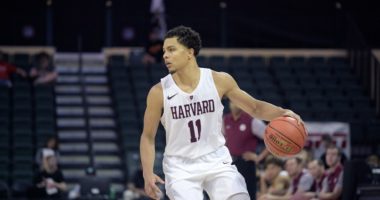Go straight to the content.

The current state of affairs in Massachusetts prohibits betting on any sports events, and there are individuals advocating for the preservation of this status quo, particularly concerning Massachusetts college sports betting. Recently, university presidents and athletic directors in the state have expressed their support for maintaining these sentiments.
Similar to the varying approaches taken by states that have already legalized sports betting, colleges and universities have also displayed differences in their responses to gambling.
The hub-bub about Massachusetts college sports betting
During the upcoming legislative session, the Massachusetts Assembly may revisit the possibility of legalizing sports betting.
The framework desired by the presidents of the eight colleges and universities involved in D1 basketball aims to prohibit betting on collegiate events.
In their collective statement, they express concern that permitting college sports betting would pose avoidable and undesirable hazards to student-athletes, fellow students on campus, and the overall integrity and ethos of colleges and universities in the state.
Similar arguments have been made in other jurisdictions by people.
They further assert that college sports betting will heighten the allure for student-athletes to manipulate game results or point spreads in exchange for financial gain or other advantages offered by betting entities.
Furthermore, college athletes might face severe criticism from individuals who lost money as a consequence of their actions.
On the other hand, critics argue that by excluding college sports teams, there is actually a higher risk of match-fixing, as their games are not subject to the integrity monitoring provided by regulated markets.
Furthermore, individuals who seek to manipulate games often resort to utilizing illicit bookmakers and/or offshore platforms to make their bets.
Thus far, various jurisdictions have opted for distinct regulatory approaches in managing this particular sector of the industry. However, a definitive and optimal method to address these concerns has yet to emerge.
Indiana’s “laissez-faire” to Virginia’s local exemptions
There are no specific laws or regulations in states such as Colorado and Indiana regarding betting on college sports. Wagering on these events is treated like any other event in these states.
Iowa and Tennessee are states that have taken measures to regulate betting on college sports while maintaining its permissibility. These states have implemented restrictions specifically targeting in-game and/or prop bets on college sports.
Betting on college games involving in-state teams is prohibited in states such as Illinois and Virginia.
Determining the superior approach is premature at this point. Similar to car parts, integrity controls often go unnoticed unless they malfunction.
Similarly, the response from colleges in these states has varied. Colorado and Purdue serve as contrasting illustrations, representing universities located at opposite extremes.
Purdue’s ban and Colorado’s brand
In the previous year, Purdue University situated in West Lafayette, IN, established a policy that forbids faculty, staff, and students from engaging in any form of betting on Boilermaker sporting events. This policy extends to placing wagers with sportsbooks that are legally operating within the state of Indiana.
Last week, the athletic department of Colorado revealed a collaborative alliance with PointsBet, an Australian company that provides online casino services alongside online and retail sports betting across multiple states, including Colorado.
While one college chooses to suspend students involved in sports betting, another college actively encourages this activity. It is still too soon to determine which approach will yield better results.
As the legalization of sports betting progresses in Massachusetts, bettors will find this development particularly intriguing. It is evident where the college presidents in the Bay State stand on this matter.






